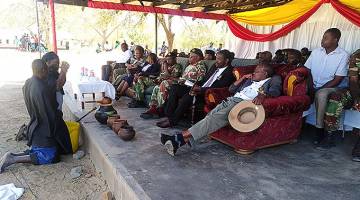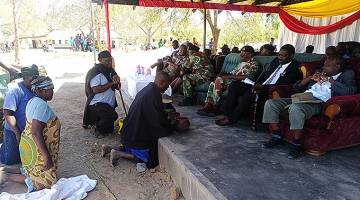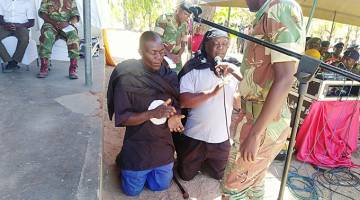Army deepens relations with traditional leaders

Talent Chimutambgi Features Writer
The military and traditional leaders enjoy cordial relations that date back to the liberation struggle which led to the attainment of independence in 1980.
During the 1970s protracted armed struggle, freedom fighters and traditional leaders had a “fish and water” bond – which was mutually beneficial and aided the war against the enemy.
Freedom fighters could not survive without traditional leaders and their communities. Equally, traditional leaders and their communities could not enjoy the peace and stability prevailing in the country without the sacrifice of the freedom fighters.
Before freedom fighters launched offensive attacks in any area, particularly in rural areas, they first introduced themselves to the traditional leaders who gave them approval to operate in their area.
Freedom fighters were taught the values and traditions of a particular community and their spirit mediums.
To further cement these liberation war era relations, the Zimbabwe National Army recently organised the Traditional Leaders Day in the Chiweshe area under Chief Madombwe in Mashonaland Central.
The venue was carefully chosen for its liberation war history. Within the area there is a mountain called Gombekombe which is sacred and is a repository of liberation war history.
The mountain was strategic for tactical purposes at the height of the liberation war. It was used for hiding by the freedom fighters. Freedom fighters could hide in caves and plan fresh attacks against the Rhodesian forces.
Speaking during a colourful ceremony to commemorate the interface between the army and traditional leaders, Brigadier General Ernest Shamhu said the Traditional Leaders Day was a day set aside to reflect on the roles traditional leaders played during and after the liberation war.
“This day was set aside by the Zimbabwe National Army to reinforce the relations between the army and traditional leaders in recognition of the indispensable role they played during and after the liberation war, and currently in the socio-economic development of the country,” he said.
“Traditional leaders are an important component of the government, dating back to the pre-colonial era where they were the backbone of societal strength and unity, the link between the chiefs and the military as they had a strong army on their side to defend, capture, and conquer areas as well as extending areas of jurisdiction.”
Brig Gen Shamhu described the ceremony, which was headlined by the Headquarters Artillery Brigade, as a milestone that would further cement the relations between the military and traditional leaders.
He added that traditional leaders had a role in defending the country spiritually.
“This ceremony will deepen our relations with traditional leaders. Chiefs are indisputably a cogwheel in the security architecture of our country the same as the military defence is not only physical possession of arms of war but also spiritual and enforcement of laws,” he said.
Touching on the sacred Gombekombe mountain, Brig Gen Shamhu said chiefs had a role of preserving sacred sites in the country.
“Traditional leaders define and uphold our cultural values, they are custodians of our traditional and cultural values. Traditional leaders also provide guidance in the preservation of sacred places which define where we come from,” he said.
Speaking at the same event, Minister of State for Mashonaland Central province Mrs Monica Mavhunga said the Government remained committed to supporting traditional leaders.
“We need to value our traditional leaders and recognise their duties. President Mnangagwa’s government will make sure that chiefs are logistically covered, it’s a bid again to restore their dignity,” she said.
Minister Mavhunga said as the Government was making efforts to improve the living standards of chiefs.
At most homesteads, she said, water tanks had been installed to enhance access to water by traditional leaders.
She added that plans were underway to give chiefs maize to ensure food sufficiency in their areas of jurisdiction.
“Food distribution shall be carried out regardless of political affiliation,” said Minister Mavhunga.
She urged chiefs to exercise their powers in preserving natural resources to reduce the unnececessary cutting down of trees as a result of tobacco farming and other activities by gold panners.
Chief Makope of Mount Darwin said soldiers should identify themselves with the people to help deepen their relations.
“Our soldiers must continue to foster the spirit of unity between traditional leaders and themsleves. I wish that such programmes and events could be extended to all other areas. It is something that we were not used to but I’m am happy that the ZNA is promoting the respect of our cultural values,” he said.
“We appeal to the government to support us in all programmes relating to chieftainship so that our country’s dignity is restored.”
One headman Guchu said they were graves of freedom fighters in the Gombekombe mountain and that such events commemorated the lives of selfless and dedicated sons of the soil.
Major Ben Zonke, a former freedom fighter who coordinated relations between the army and local inhabitants in Mashonaland Central province, said people should not forget the sacrifices of comrades who died in Gombekombe mountain.
“Some brutal killings were as a result of our fellow citizens who were aiding our enemies to disclose hiding places of comrades. A lot of comrades and citizens were decapitated and lost their lives, so when we talk of Gombekombe mountain, we are talking of liberation war, history,” he said.
Cde Satos Gurure, a war collaborator, narrated how she joined the liberation struggle after she was forced to drop out of school.
“I was forced to drop out from school alongside comrades Kufeya Feya, Mabhunu Muchapera, Mabhonzo and many others. Rhodesian soldiers got wind of our presence in the mountain and they came in numbers to attack us. There was an intense battle here and we lost Cde Mabhonzo…I took his riffle and continued with the fight.
“We never gave up. We laid landmines, and killed a lot of Rhodesian soldiers,” she said.
Commander of Artillery Brigade, Brigadier General Stanley Mangena thanked the local community for attending the event which saw chiefs receiving inputs from Agriseeds to revive the Zunde Ramambo.















Comments